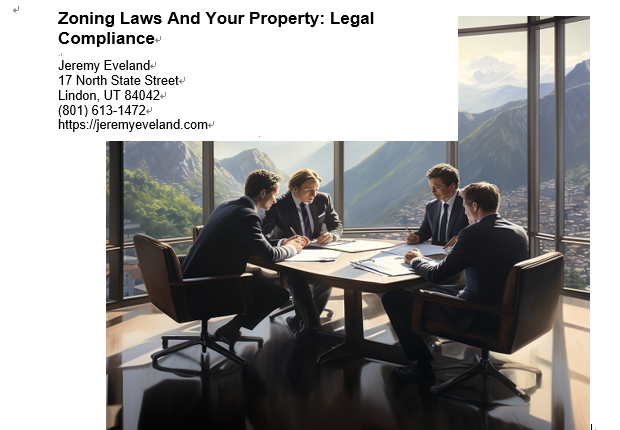This page is about Business Law.
Are you a property owner who wants to ensure that your property is in compliance with zoning laws? Understanding and adhering to zoning laws is crucial to avoid potential legal issues and penalties. In this article, we will explore the importance of legal compliance with zoning laws and how it can impact your property. By providing comprehensive and exhaustive information on the topic, we aim to empower you with the knowledge necessary to navigate zoning laws confidently. Whether you are a homeowner, business owner, or investor, this article will guide you through the intricacies of zoning regulations and motivate you to seek professional legal advice from attorney Jeremy Eveland.

Understanding Zoning Laws
Zoning laws are regulations that are put in place by local governments to control how land and buildings are used within a specific area. The purpose of these laws is to ensure that properties are used in a way that is compatible with the surrounding area and promotes the health, safety, and welfare of the community as a whole. Zoning laws divide areas into different zones or districts, each with its own set of rules and restrictions regarding land use and building regulations.
Types of Zoning
There are several different types of zoning that you should be aware of when it comes to understanding how your property is regulated. The most common types of zoning include residential, commercial, and mixed-use zoning.
Residential zoning is the most prevalent type and is intended for single-family homes, apartments, and other types of housing. Commercial zoning is for businesses and is typically found in areas with a higher concentration of commercial activity. Mixed-use zoning combines both residential and commercial uses within the same area, allowing for a blend of housing, retail, and office spaces.
Importance of Complying with Zoning Laws
It is crucial to comply with zoning laws to avoid potential legal issues and fines. By adhering to these laws, you help maintain the integrity and character of the community while ensuring your property is being used in a manner that is allowed by local regulations. Failure to comply with zoning laws can result in violations, penalties, and even forced closure of your business or eviction from your property. It is essential to understand and comply with the zoning laws to protect your property rights and avoid unnecessary legal complications.
Determining Your Property’s Zoning
To determine the zoning classification of your property, you can begin by contacting your local planning department. They will have information regarding the zone in which your property is located and can provide you with zoning maps and any applicable ordinances. Reviewing these documents will give you a better understanding of the specific rules and regulations that apply to your property.
Additionally, you may want to consider hiring professionals who specialize in zoning research. These individuals have experience navigating zoning regulations and can help you determine the most accurate information about the zoning classification of your property. They can also assist in interpreting complex zoning ordinances and provide guidance on compliance.
Zoning Laws and Property Use
Each zoning district has specific regulations regarding the types of uses that are permitted within that area. Understanding these regulations is crucial for property owners and potential buyers. Residential zoning regulations typically allow for housing, while commercial zoning may have restrictions on residential use and specific guidelines for businesses. Mixed-use zoning offers the most flexibility by allowing a combination of residential, commercial, and even industrial uses.
It is essential to familiarize yourself with the permitted uses in your specific zoning district to ensure that you are using your property within the bounds of the law. Violating these regulations can result in significant consequences, such as fines, lawsuits, and forced closure of businesses. Understanding the specific regulations allows you to make informed decisions about how to use your property while complying with the law.
Compliance with Building Codes
Zoning laws and building codes go hand in hand when it comes to property development and construction. Building codes are designed to ensure the safety and structural integrity of buildings, while zoning laws focus on the use and overall appearance of properties. Compliance with both sets of regulations is necessary to avoid legal issues and potential dangers.
Before beginning any construction or renovation project, it is crucial to obtain the necessary building permits. The permitting process typically involves submitting plans and specifications to the local building department for review. During this review process, the department will ensure that the proposed project meets all applicable building codes and zoning regulations. Failure to obtain the required permits can result in fines and even the demolition of the non-compliant structure.
Working with licensed architects and contractors who are familiar with local building codes and zoning regulations is highly recommended. These professionals understand the intricacies of the building and zoning processes and can help ensure compliance from the initial design phase to the final construction. By involving experts in the process, you can mitigate the risk of common building code violations and non-compliance with zoning regulations.

Special Exceptions and Variances
In certain situations, property owners may seek special exceptions or variances from zoning laws. Special exceptions refer to specific uses that are allowed in a zoning district but require additional approval from the local government. Variances, on the other hand, involve a request to deviate from the standard zoning requirements due to practical difficulties or hardships.
If you believe your property meets the criteria for a special exception or a variance, you will need to follow the appropriate process outlined by your local government. This process typically involves submitting an application, attending public hearings, and demonstrating that your request meets specific guidelines. It is important to note that special exceptions and variances are not guaranteed, and each application will be evaluated on a case-by-case basis.
Seeking legal assistance from an experienced attorney who specializes in zoning law can greatly benefit your efforts in seeking special exceptions or variances. An attorney can navigate the complex application process, gather necessary evidence, and present a convincing case to the zoning authorities on your behalf.
Dealing with Zoning Violations
Zoning violations occur when a property owner fails to comply with the regulations outlined in the zoning laws. Examples of common zoning violations include operating a business in a residential zone, exceeding building height restrictions, or conducting activities that produce excessive noise or traffic.
When a zoning violation is suspected or reported, the local zoning authorities will typically investigate the complaint. Actions taken by the zoning authorities can range from issuing warning notices to imposing fines, revoking permits, or even seeking a court order to enforce compliance. The consequences of non-compliance can be severe and can significantly impact both residential and commercial property owners.
If you find yourself facing a zoning violation, it is important to seek legal advice promptly. A knowledgeable attorney can assess your situation, determine the best course of action, and help you navigate the process of resolving the violation. They can also help you explore potential legal defenses and remedies that may be available to protect your property rights and mitigate the consequences of non-compliance.

Appealing Zoning Decisions
Property owners have the right to appeal zoning decisions if they believe the decision was made in error or unfairly. Common reasons for appealing zoning decisions include disagreements with the interpretation of zoning laws, concerns about the impact on property values, or objections to the process followed by the zoning authorities.
To initiate an appeal, the property owner must typically submit a written notice of appeal to the appropriate government body within a specified time limit. The appeals process often involves presenting your case before a board or commission responsible for reviewing zoning decisions. It is essential to gather evidence, prepare a persuasive argument, and adhere to the procedural requirements outlined by your local government.
Seeking legal representation for a zoning appeal can significantly improve your chances of a successful outcome. An attorney who specializes in zoning law will have the expertise to navigate the complex appeals process, present your case effectively, and advocate on your behalf. They can provide valuable guidance and support throughout the entire appeal process, giving you the best chance of achieving a favorable result.
Changing Zoning Regulations
With the changing needs of communities, zoning regulations may need to be modified over time to accommodate new development or land use patterns. Zoning amendments are the process by which these changes are made to the existing regulations. The purpose of zoning amendments is to ensure that the regulations align with the community’s goals and vision for future development.
Advocating for zoning changes involves understanding the existing regulations, identifying areas that need modification, and actively engaging with the local government and community stakeholders. This may include participating in public hearings, gathering support from affected property owners, and presenting well-reasoned arguments that justify the proposed amendment.
Navigating the zoning amendment process can be complex, and having an attorney’s assistance can be invaluable. An attorney can help guide you through the steps involved, draft necessary documents, and effectively communicate your position to the local government. Their expertise in zoning law ensures that your proposed changes are presented accurately and in compliance with the procedural requirements.
Neighbor Disputes and Zoning
Zoning issues can often lead to conflicts between neighbors, particularly when there are disputes over property use, noise, or other related matters. These disputes can strain relationships and negatively impact the enjoyment of your property.
If you find yourself in a neighbor dispute related to zoning, seeking resolution through mediation is often the best approach. Mediation allows the involved parties to communicate their concerns and work towards a mutually acceptable solution with the help of a neutral third party. Mediation can save time, money, and stress compared to resolving disputes through litigation.
However, if mediation fails to bring about a resolution, it may be necessary to take legal action against violating neighbors. In such cases, it is essential to consult with an attorney who specializes in zoning law. They can advise you on your legal rights, help you gather evidence to support your case, and represent your interests in court if necessary. Protecting your property rights is paramount, and an experienced attorney can provide the guidance needed to navigate the legal process effectively.
Consulting an Attorney for Zoning Issues
When it comes to zoning issues, consulting with an experienced attorney is highly recommended. Hiring an attorney brings several benefits, including legal expertise, guidance, and peace of mind.
An attorney specializing in zoning laws will have in-depth knowledge of the regulations that apply to your property and the surrounding area. They can provide the necessary guidance to ensure compliance with zoning laws, from determining your property’s zoning classification to navigating complex zoning processes. Their expertise ensures that you are making informed decisions and protecting your property rights.
In the event of a zoning dispute, an attorney can serve as your advocate and represent your interests. They can analyze your situation, develop a legal strategy, and negotiate on your behalf. If litigation becomes necessary, an attorney will have the skills and experience to provide effective representation and achieve the best possible outcome.
By consulting with an attorney, you can achieve peace of mind knowing that you have a knowledgeable professional by your side. They will guide you through the intricacies of zoning laws, provide you with accurate information, and ensure that your rights and interests are protected every step of the way.
In conclusion, understanding zoning laws and their impact on your property is crucial for all property owners. By familiarizing yourself with the different types of zoning, complying with regulations, and seeking legal assistance when needed, you can navigate the complex world of zoning with confidence. Whether you are considering a property purchase, constructing a new building, or dealing with a zoning violation, consulting with an experienced attorney like Jeremy Eveland can be invaluable in ensuring legal compliance and protecting your property rights. With their expertise, you can confidently address any zoning issues that may arise and achieve the best possible outcome for your property.
For a free consultation, consider this attorney:
**Jeremy Eveland**
8833 South Redwood Road
West Jordan, Utah 84088
(801) 613-1472
Jeremy Eveland | (801) 613-1472 (https://jeremyeveland.com/)





Comments are closed.